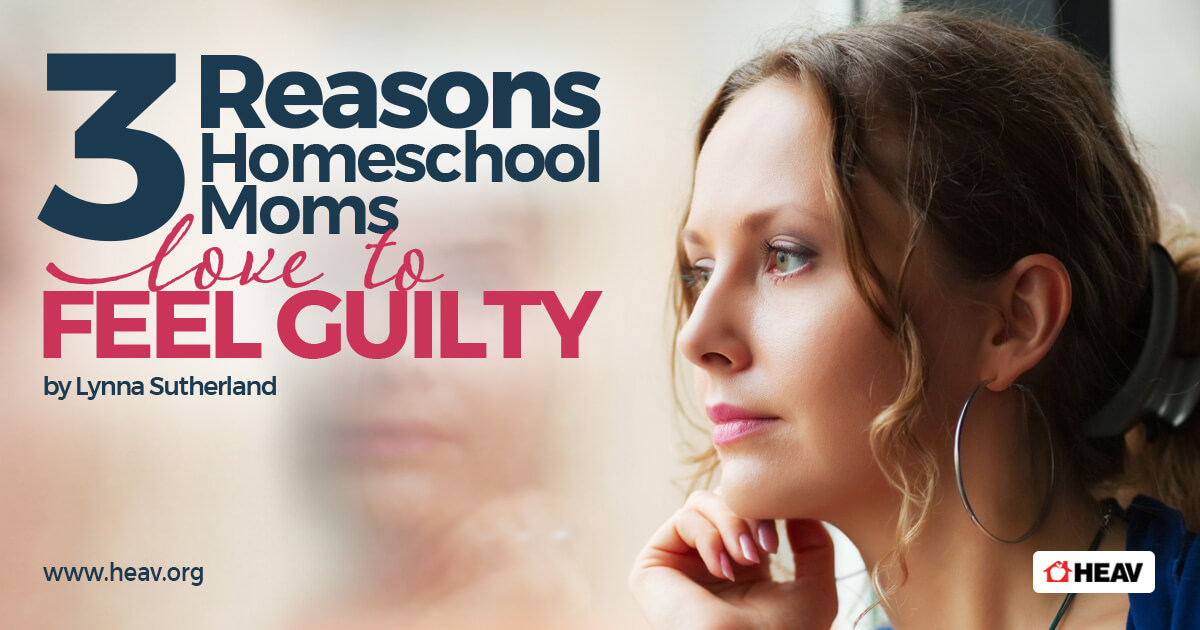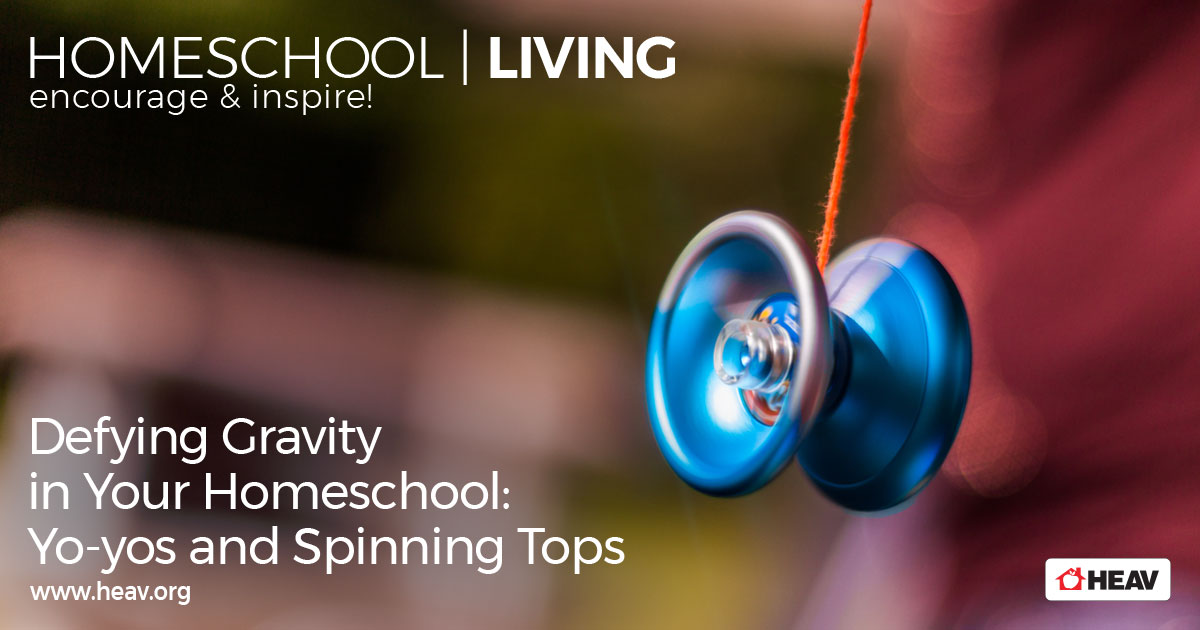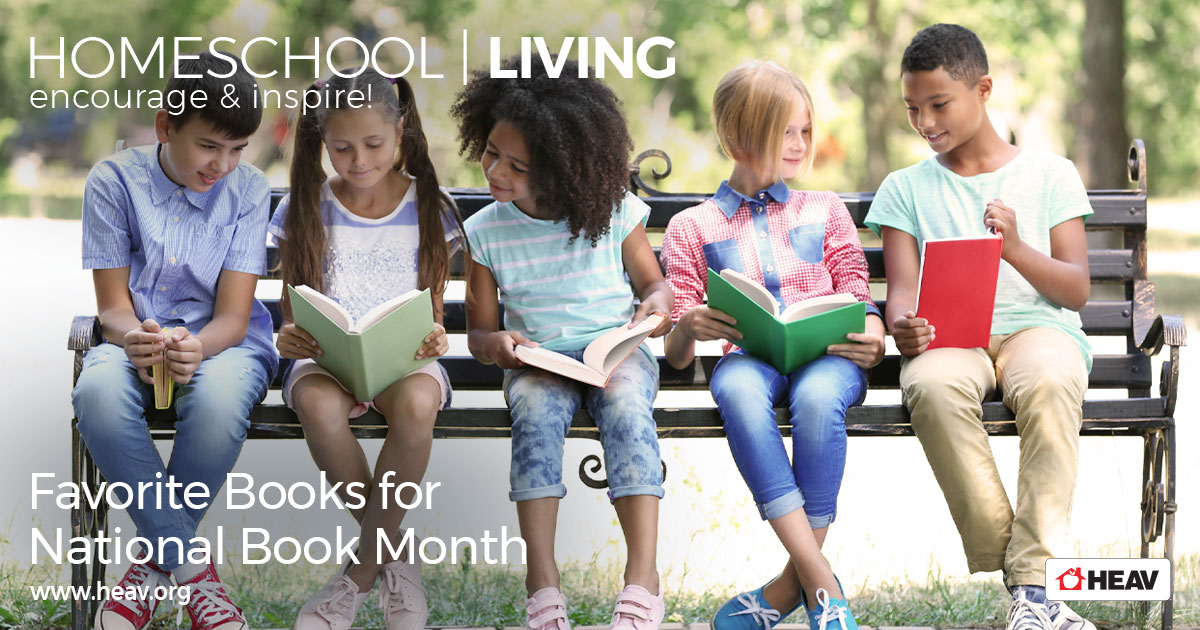3 Reasons Homeschool Moms Love to Feel Guilty
by Lynna Sutherland
There’s just no way I can do it all. (I’ve known this for a while now!) But it’s still hard for me to say no and limit my commitments to a reasonable level. The other day, as my husband and I were discussing some of the things I can’t do right now, he said, “If I didn’t know better, I’d think you wanted to feel guilty about this.”
It was a lightbulb moment for me. The more I thought about it, the more I realized that there are ways in which I choose to feel guilty. Here are some of the ways I’ve seen that play out in my own life and heart.
Demonstrating Zeal
Nobody wants to be thought of as negligent or apathetic. Sometimes that drives us to take on more responsibilities than we can handle. We overcommit to the point of not being able to complete any of our tasks well.
When that doesn’t work and we have to scale back, we worry that others will think we don’t care. And we imagine that the opposite of apathy must be anxiety. If I can’t actually agree to be on the committee or help with the project, at least I can profusely express how totally rotten I feel that I have to say no! That should count for something, right?
Being “Real”
There is so much talk these days about being “real” and not “pretending like you have it all together.” On one level, this is an important thing to consider. We certainly don’t want to be deceptive or become a discouragement or stumbling block to others.
We also want to make sure we’re not boasting in our accomplishments. So instead, whenever someone compliments us (or one of our children), we feel obligated to counter with everything we do wrong or everything that’s wrong with our children. After all, freely sharing our weaknesses is what humility is all about, right?
Preemptive Criticism
When we first moved into this house and friends would come to visit, I’d give them a tour. I’d take them from room to room, point out all of the things that were obviously wrong with it and expound on my plans to change, fix, or improve it.
It bothered my husband that my “house tour” focused on the problems and imperfections rather than the blessings and things to be thankful for. I realized that pointing out these little issues was my way of preempting anyone thinking perhaps I didn’t notice the issues or wasn’t planning to do anything about them. If I criticize myself first, then no one else will feel the need to do it, right?
The Dangers
Yes, I can certainly see why I have my reasons for choosing to feel guilty. But isn’t that just the humble thing to do? Isn’t it noble to acknowledge that I’m not perfect and be honest about my struggles? Yes. But often we feel unnecessary guilt, and this can lead to several problems.
One of the dangers of unnecessary guilt is that it clouds our consciences and makes us insensitive to real issues that need to be dealt with. Like a car alarm, our conscience “goes off” for so many non-emergencies that we just learn to live with the feeling, making the warnings virtually useless.
We also waste precious energy lie awake at night feeling bad about not helping. And if you said no so that you could keep other obligations (such as to your family), your nagging guilt certainly doesn’t help you to be more engaged with those activities!
We also need to consider the fact that we may be inadvertently heaping burdens on other people. Are all the little things that we “confess” making others feel that they should also apologize for these little things? Do we communicate that we disapprove of all of their tiny flaws as fervently as we do of our own?
And finally, we may actually be prohibiting someone from exercising their calling as a friend. The Lord tells us to encourage one another. Are you able to graciously accept the encouragement that others extend, or do you feel the need to negate it and slap it down, making the encourager feel as though he or she has done something insensitive?
The Solution
One of my favorite articles on guilt is by Kevin DeYoung called Are Christians Meant to Feel Guilty All the Time?
DeYoung points out that so often our feelings of guilt are not based on actual, identifiable sins, but simply the longing to be further along a spectrum of growth in personal holiness. We will never feel that we pray, give, do, serve, sacrifice [insert your own] enough.
But that’s not the same as committing a sin. We need to recognize that growth is a part of life on this earth and be comfortable with always being “in process.”
My mom, a Christian counselor (and the most wonderful mother ever), likes to use the analogy of rocks in a backpack. We are weighed down by emotional burdens and we need to take the rocks out of our backpack and sort through them.
- Some rocks are sins that need to be confessed. Repent. Ask for forgiveness—from God and from anyone you may have wronged. Rest in the righteousness of Christ as the covering for those sins and have peace of conscience.
- Some rocks are really someone else’s problem. Is someone judging your housekeeping skills or your children’s behavior unfairly? That’s really a rock in their backpack. Talk about it with them or let it go. But in the end, recognize that it reflects on them, not on you, and have peace of conscience.
- Some rocks need to be tossed all together. Do you have a dirty carpet? Not a fabulous cook? Don’t feel qualified to lead a Bible study? These are not sins. Put down those rocks. Go to bed with a clean conscience!
Especially during the holiday season, moms carry lots of unnecessary guilt. We become so accustomed to the knot in our stomach and the nagging voice in the back of our heads that we just learn to live with it. This isn’t helpful to anyone—especially you. Sort out those rocks, sister!
Lynna Sutherland blogs at Homeschooling Without Training Wheels, where she loves to remind moms (and herself!) of the freedom and flexibility that come with homeschooling! Lynna and her husband have seven children. The motto of their homeschool is “Wisdom Is the Principal Thing” from Proverbs 4:7. You can also find Lynna on Instagram, Facebook and Pinterest.
Lynna hosts a private Facebook group called Family Schooling Without Training Wheels specifically for encouraging parents in multi-age homeschooling and outside-the-box approaches to meet the needs of their unique family.









